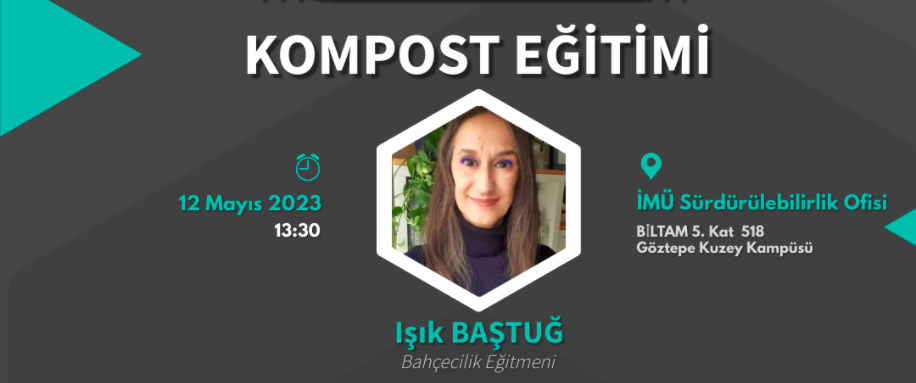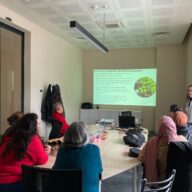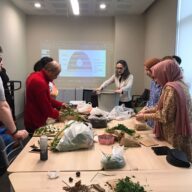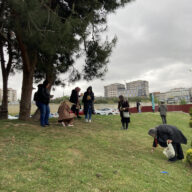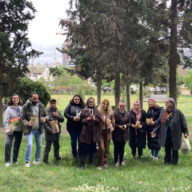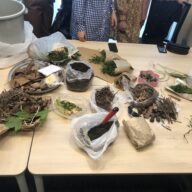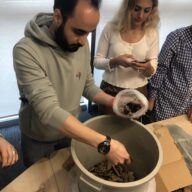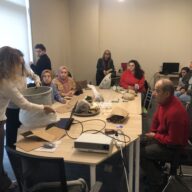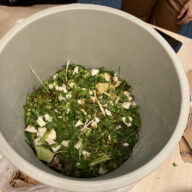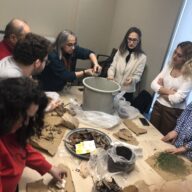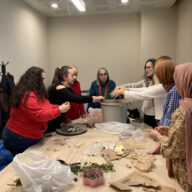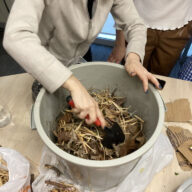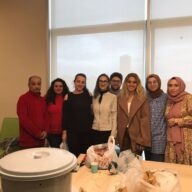Istanbul Medeniyet University Sustainability Office organized a “Compost Training” in 7-13 May Compost Awareness Week. Held in the Sustainability Office on May 12, 2023, the training was delivered by gardening trainer IŞIK BAŞTUĞ and the workshop was facilitated by IMU Sustainability Office member Res.Asst. Ayça ÇELİKBİLEK. Also designed as an environmental training, the workshop was open to public participation including local farmers and food producers, in addition to our students, academic and administrative staff. During the workshop, various topics were taught including the importance of compost and source reduction, how to make compost, types of compost, and compost-soil-plant relationship. Theoretical training was followed by a compost making workshop using food waste in our campus.
In the opening speech, Res.Asst. Ayça ÇELİKBİLEK noted that hunger risk is increasing for all countries as time passes and the number of undernourished people amounted to a total of 821 million globally in 2017. On the other hand, she underlined that one third of all food produced around the world goes to waste every year and while 74 kg of food waste per person was globally generated in 2021, the rate was 93 kg for Turkey. Noting that food waste has a share of eight percent in global greenhouse gas emissions, ÇELİKBİLEK stated that in today’s world where we are faced with lack of food in one place and food waste in another, composting organic waste is a complete win-win solution for creating a sustainable world. She emphasized that compost not only reduces the harmful effects of leaving biowastes rotting in landfills or burning them off and carbon footprint, but it also helps keeping the soil healthy and preserving biodiversity by increasing organic matter in soil and eliminating the need for chemical fertilizers.
The opening speech was followed by the theoretical training on compost delivered by gardening trainer Işık BAŞTUĞ, who started by highlighting the importance of source reduction of wastes. She noted that 1.13 kg of domestic waste per person is generated daily in Turkey, an amount of organic waste with which 12,000 tons of compost could be produced annually, while 200MW energy could be generated with the ensuing landfill gas to meet the energy needs of 2.5 million people, amounting to a significant reduction of ecological footprint in urban areas.
BAŞTUĞ explained that composting is a process that basically occurs when browns, greens, sufficient humidity, and air come together and by composting, we obtain a material that will regulate and nourish the soil and will serve as a fertilizer. Yet, she also stressed that wild plants containing seeds, onion peels, rotten plants, droppings of animals such as cats and dogs, and peels of acidic fruits should not be added to a healthy compost.
After providing basic information about composting, BAŞTUĞ went on to inform the audience about hot compost, cold compost, and vermicompost (worm castings) and how to apply these composting methods.
Following the theoretical training, IMU Sustainability Office served the participants tea, which is a symbol of Turkish identity and hospitality and social interaction and during the tea break, trainer Işık BAŞTUĞ answered the participants’ questions about composting. After the break, the participants went out in groups to collect the “browns” and “greens” from the green areas around Göztepe North Campus as the materials to be used in the application stage of the training. At this stage, they collected materials such as fallen leaves, twigs, and barks around the trees in our campus as “browns” and grass clippings as “greens”.
Once the materials were collected, composting application was initiated in the Sustainability Office. At the beginning of the application stage, as all participants were taking out the materials they collected and putting them up on the table, BAŞTUĞ informed them about whether the materials were suitable for composting. In addition to the materials collected by the participants, Res.Asst. Ayça ÇELİKBİLEK added to the list the celery scraps from the daily menu of our campus kitchen and dried tea and coffee grounds from the office and noted that the composting workshop is very important for IMU’s food waste reduction policies, zero waste policies, and sustainability activities and will be a significant contribution to the ongoing efforts. At the application stage of the workshop, all the participants placed their materials into the compost bin and a hot compost application was carried out in the light of the principles outlined in theoretical training.
The workshop ended after gardening trainer Işık BAŞTUĞ was presented a certificate of appreciation.
Your organic recycling activity that you do as a good act does more than you think. Recycling of wastes mean less greenhouse gases in the atmosphere. And using compost nourishes the soil. Our soils then respond to this good act with healthier food, cleaner water, richer biodiversity, and reduced impacts of climate change. Thank you for doing the best you can.

